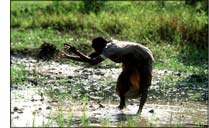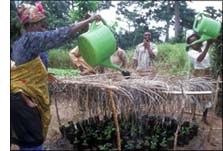Agricultural water management solutions project
 FAO, IWMI, IFPRI, SEI, and IDE joined forces to address agricultural water management for small-scale agriculture in sub-Saharan Africa and South Asia through the financial support of the Gates Foundation.
FAO, IWMI, IFPRI, SEI, and IDE joined forces to address agricultural water management for small-scale agriculture in sub-Saharan Africa and South Asia through the financial support of the Gates Foundation.
The Bill and Melinda Gates Foundation (BMGF) funded this project to help design agricultural water management strategies for smallholder farmers in sub-Saharan Africa and in India. The project was managed by the International Water Management Institute (IWMI) and jointly operated by IWMI, FAO, IFPRI, the Stockholm Environment Institute (SEI) and IDE, an NGO specialised in small scale water technologies. The project was implemented in Burkina Faso, Ethiopia, Ghana, Tanzania, Zambia and India (Madhya Pradesh and West Bengal).
Why this project was needed
Small-scale farmers account for the majority of South Asia’s and sub-Saharan Africa’s poor and roughly half of the developing world’s undernourished. While water is not the only constraint to improving crop production and nutrition if farmers don’t have reliable access to water, interventions to address the other constraints, such as soil fertility and access to markets and inputs, will fail. For example, reliable access to water gives farmers the security to invest in inputs, such as fertilizers and improved seeds, and enables them to grow higher-value crops, such as fruits and vegetables.
The project built on smallholder farming potential to be an engine for economic growth, poverty reduction and food security. In many areas, reliable access to water was what was missing from the equation. Without the means to control and effectively manage water, poor farmers were unable to turn agriculture from a subsistence activity into an income-generating enterprise.
Project focus
 The project helped to unlock the potential of smallholder farming by focusing on agricultural water management (AWM) solutions which included identifying technologies as well as the necessary supporting policies, institutions and business models to make AWM solutions available and viable, so that poor farmers could benefit from them.
The project helped to unlock the potential of smallholder farming by focusing on agricultural water management (AWM) solutions which included identifying technologies as well as the necessary supporting policies, institutions and business models to make AWM solutions available and viable, so that poor farmers could benefit from them.
More specifically, the goal of the project was to stimulate and support successful agricultural water management (AWM) investment, policy and implementation strategies through concrete, evidence-based knowledge and decision-making tools. It aimed to understand the opportunities and constraints of a number of small-scale AWM interventions in different settings and identified concrete measures to overcoming or facilitating them.
Expected outputs
The major output of the project was a set of science-backed tools and recommendations that can be used by policy makers, donors, investors, government agencies, NGOs, rural communities and small holder farmers.
In particular, the project developed:
- Platforms for policy dialogue and investment briefs to inform AWM decision-making.
- Tools to craft sustainable AWM solutions and evaluate the economic, social and environmental impacts.
- Business models to support the spread of AWM technologies and effective implementation approaches to ensure maximum impact.
- Methods and approaches for selecting and applying appropriate AWM technologies.
Project website: awm-solutions.iwmi.org
